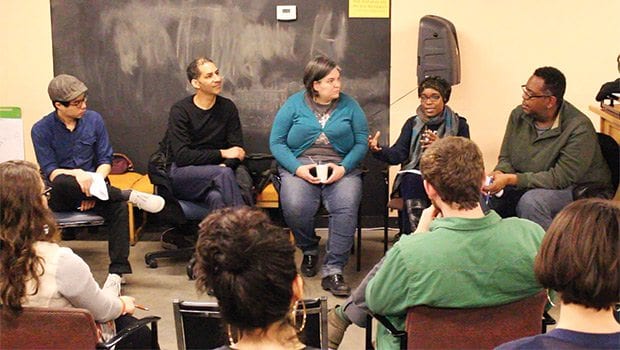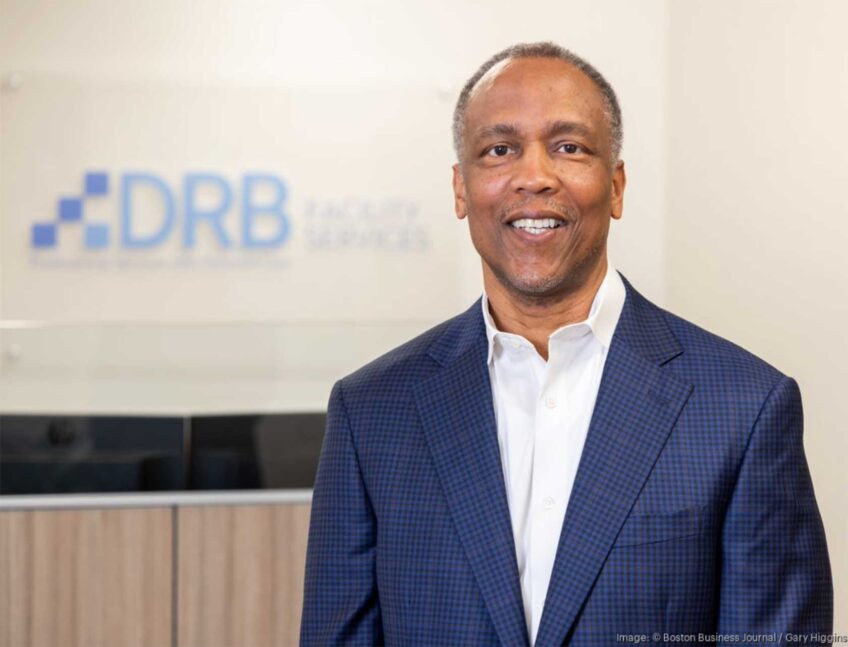A people’s economy in the Hub
Boston Ujima Project prepares to launch local investor network

Dozens of local organizations, small businesses, community leaders, and working class residents of Boston are collaborating to create a democratic community development ecosystem and local economy. The organizers envision the Boston Ujima Project will be a multistakeholder network that will invest in local initiatives, create jobs and distribute wealth for communities of color.
“Part of what we’re responding to is discrimination, racism and who has access to traditional capital,” said Aaron Tanaka, one of the organizers of the project. By that he means the wealth inherited over generations among privileged families and loans acquired by banking institutions.
“Let’s recognize that we do have capital amongst ourselves, and if we are able to pool it, we will be able to start undoing some of the disparities in access to finance,” he said.
“Ujima” is a Swahili word and Kwanzaa principle that stands for collective work and responsibility. “For us, it represents the idea that we need to see our neighbor’s problems as our own and collectively solve them together,” said Tanaka.
Around 35 organizations and 75 individuals have been involved in the planning of Ujima since last July, according to Tanaka. Participants of the project include NAACP, City Life/Vida Urbana, Boston Center for Community Ownership and Boston Impact Initiative, among others.
Lisa Owens, executive director of City Life/Vida Urbana, said that the idea of Ujima was formed by combining the best elements of different community economy models during a year-long cross sector study group hosted by the Center for Economic Democracy, Boston Impact Initiative and City Life/Vida Urbana.
“Each element of Ujima is not new, but a collective organization like this has never been organized in Boston, to our knowledge,” said Owens.
Capital accountability
Tanaka worked for seven years as the executive director of Boston Workers Alliance where he saw the need for creating job opportunities and community controlled businesses.
“I learned a lot about co-op business development and the needs of small businesses,” he said. His subsequent work with the Boston Impact Initiative and co-founding CED put him at the forefront of helping create Ujima.
Organizers of the Boston Ujima Project have outlined the framework for its anti-poverty and community development mission as a machine with multiple moving parts. Those parts include: Good Business Certification and Alliance; Community Capital Fund; Worker Empowerment Network; Anchor Institution Advocacy; and Alternative Local Currencies.
The project plans to recognize and certify local businesses as “Good Businesses” if they fit the community standards that members of Ujima will decide on together. The standards will consider business practices such as living wages, CORI-friendly hiring, environmental impact, and affordability. Certified companies will receive a seal for storefront display and be eligible to join Ujima’s Business Alliance to gain access to capital, technical assistance and support from the community.
“Not all businesses are going to be meeting our standards right away,” said Tanaka. “But as long as they’re from the community and they want to do the right thing, our goal is to help them be successful.”
The Worker Empowerment Network will ensure that employees of Ujima businesses that are either receiving a loan or are a part of the community will have their voices heard. Ujima will act as a human resource department and focus on issues like health insurance packages and workplace mediation.
With Anchor Institution Advocacy, Ujima hopes to appeal to universities and hospitals in Boston to be stakeholders.
“These hospitals and universities collectively purchase billions of dollars of goods and services every year. But little of that money is going to local businesses,” said Tanaka. “We want to advocate for these major purchasers to start supporting community businesses, ideally through Ujima.”
As part of the project’s alternative local currency system, Ujima members will have access to an internal electronic currency that offers consumer discounts at “Good Businesses” and interest-free credit for business to business purchasing. In addition, members will be able to trade skills and labor with one another through time banking. The goal for these initiatives is to circulate resources within the community to grow local wealth.
Collaborative capitalism
One of Ujima’s main power sources for its moving gears is the Community Capital Fund which will pool savings and investments from members. Their goal is to build a multi-million dollar fund where the average community member can contribute small amounts and larger organizations can contribute more capital. Members will then vote on which business and real estate investments to make, and then reinvest the returns back into the community.
“Where we lend and invest our capital as a group, will reflect the needs of the people in our own community,” said Tanaka. These needs can range from affordable childcare to healthy and organic groceries.
The organizers of Ujima were inspired by Boston’s participatory budgeting process for a program called Youth Lead the Change, which Tanaka helped to establish. The program allows Boston residents between ages 12 and 25 to suggest and vote on how to spend a million dollars out of the city’s capital budget. “It’s not easy to coordinate large community democratic processes but we have strong examples where people have been able to come together and propose what they need in their communities and been successful,” said Tanaka.
Tanaka said that a democratically-elected board of members will be responsible for facilitating the decision making within Ujima’s broad and expansive network.
“When we elect people, we’re not asking them to make decisions for us, we’re electing them because we think they would be good at helping us make our decisions,” he said.
Still in its planning stages, the Ujima Project does not have a formalized membership yet, only an organizing committee, but starting in the fall, the committee will recruit founding members who will be in charge of launching the organization.
Who will be able to join Ujima? Tanaka says that although specific age limits still need to be determined, the community will be open to just about anyone from undocumented immigrants to residents who have served time in prison. But the group’s main focus will be on communities of color in Boston.
Currently, the planning committee is conducting pilot projects to test their ideas and hosting community education workshops throughout the city.
Nia Evans, the Economic Development Executive Committee Chair for Boston NAACP, helped organize a community finance and investment workshop after hearing concerns from community members involved in Ujima.
“They would say, ‘We would feel better about providing feedback if we had more grounding in economics and finance,’” she said.
“We want to create the opportunity so that it feels relevant to people but also want to make sure we offer education and training so people can make good decisions for themselves and their community,” said Tanaka.
A major pilot project on the agenda is the Boston Solidarity Summit which will take place Saturday, August 13 at Hibernian Hall in Roxbury. At this public event, attendees will pool their money to create a community loan to invest in local businesses. Members of the community can invest between $5 – $500, and larger impact investors will match investments up to $5,000. Then, five black- and immigrant-owned local businesses will pitch to the participants on why they should receive the community loan.
“Our goal is to raise $10,000 and then whether you invest $5 or $500 that day, you get an equal vote in deciding where the capital goes,” said Tanaka.
The Solidarity Summit is a chance for the Ujima Project to experiment with pooling capital and utilize participatory budgeting to invest in local initiatives at a zero interest rate.
“Usually investors are seen as wealthy people, but we should all see ourselves as investors,” said Tanaka. “The Ujima project gives equal power to all investors, regardless of how wealthy they are.”






